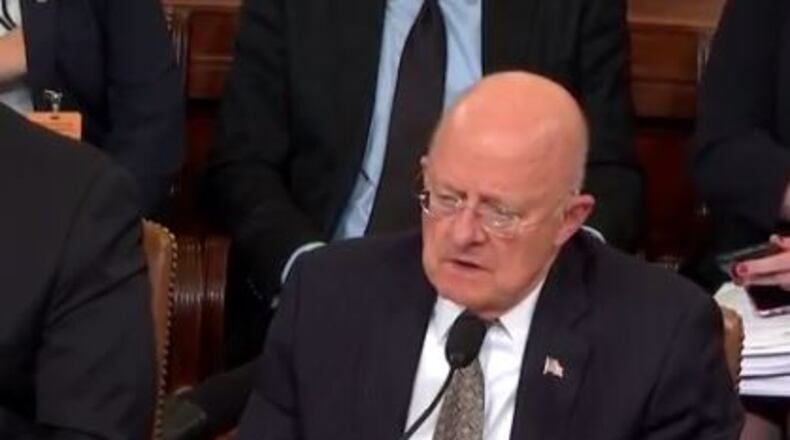Asked by Rep. Joaquin Castro (D-TX) if the Russians had shared any hacked emails from the Democratic National Committee or members of Hillary Clinton's campaign team with other people in the United States, Clapper was mum.
"This would probably be best left to classified session," Clapper said, fueling worries among Democrats that Russian Intelligence was in touch with people who backed Donald Trump for President.
As for the Russians, Clapper made clear throughout today's hearing that U.S. has no doubts that the Russians were behind hacking attempts on computer systems dealing with state election activities and more, as the U.S charged in September.
"We gave considerable thought to diming out Russia with that statement," Clapped said at a rare public hearing before the House Intelligence Committee.
"We were waiting until we felt we had a sufficient basis for it," as Clapper said both forensic and intelligence sources confirmed that assessment of Russian government cyber involvement.
After that announcement, Clapper said, that type of Russian action "seemed to be curtailed."
"The Russians have a very active and aggressive capability to conduct information operations, so-called hybrid warfare," Clapper said. "I anticipate it will continue."
Pressed by lawmakers about the links between Russian Intelligence and the group Wikileaks, Clapper said while the consensus of the U.S. Intelligence Community is that only "senior-most officials" in Russia could have authorized the hacking, the U.S. is still not ready to say that Russian Intelligence gave those specific documents to Wikileaks.
"As far as the Wikileaks connection, the evidence there is not as strong," Clapper said, "and we don't have good insight into the sequencing of the releases."
Clapper though repeatedly made clear that he thought Russia's hacking efforts on the U.S. government and political parties will likely continue into a Trump Administration.
Intelligence officials were also asked about the Russian television network RT, which spent a lot of time in recent months focused on the Wikileaks releases about Hillary Clinton's campaign, along with the White House bid of President-Elect Donald Trump.
"It is their playbook, if you look what they did in Ukraine and other places, to get the citizens to turn on themselves," said Rep. Mike Conaway (R-TX), who expressed concern about the RT network efforts to expand their broadcasts into the United States.
"They are quite successful in Europe - and they are coming here as well," Conaway added.
The hearing may have been the final one for Clapper, who has served as DNI for just over six years.
Clapper began the hearing - in his familiar gruff manner - by rejecting any talk that he would stay on for a few months into the Trump Administration.
"I submitted my letter of resignation last night, which felt pretty good," Clapper said.
"I've got 64 days left, and I think I would have a hard time with my wife if I did anything past that."
Clapper's decision will give President-Elect Trump the chance to further put his imprint on the U.S. Intelligence Community, after he is sworn in on January 20, 2017.
About the Author
